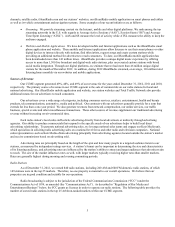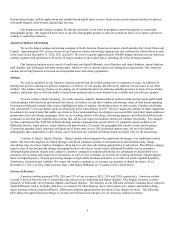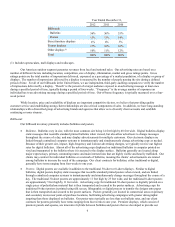iHeartMedia 2012 Annual Report Download - page 15
Download and view the complete annual report
Please find page 15 of the 2012 iHeartMedia annual report below. You can navigate through the pages in the report by either clicking on the pages listed below, or by using the keyword search tool below to find specific information within the annual report.12
Newspaper-Broadcast Cross-Ownership Rule. FCC rules generally prohibit an individual or entity from having an
attributable interest in either a radio or television station and a daily newspaper located in the same market.
Radio-Television Cross-Ownership Rule. FCC rules permit the common ownership of one television and up to seven
same-market radio stations, or up to two television and six same-market radio stations, depending on the number of
independent media voices in the market and on whether the television and radio components of the combination comply
with the television and radio ownership limits, respectively.
Alien Ownership Restrictions
The Communications Act restricts foreign entities or individuals from owning or voting more than 20% of the equity of a
broadcast licensee directly and more than 25% indirectly (i.e., through a parent company). Since we serve as a holding company for
FCC licensee subsidiaries, we are effectively restricted from having more than one-fourth of our stock owned or voted directly or
indirectly by foreign entities or individuals.
Indecency Regulation
Federal law regulates the broadcast of obscene, indecent or profane material. Legislation enacted by Congress provides the
FCC with authority to impose fines of up to $325,000 per utterance with a cap of $3.0 million for any violation arising from a single
act. In June 2012, the U.S. Supreme Court ruled on the appeals of several FCC indecency enforcement actions. While setting aside
the particular FCC actions under review on narrow due process grounds, the Supreme Court declined to rule on the constitutionality of
the FCC’s indecency policies. We have received, and may receive in the future, letters of inquiry and other notifications from the
FCC concerning complaints that programming aired on our stations contains indecent or profane language. We cannot predict the
outcome of our outstanding letters of inquiry and notifications from the FCC or the nature or extent of future FCC indecency
enforcement actions.
Equal Employment Opportunity
The FCC’s rules require broadcasters to engage in broad equal opportunity employment recruitment efforts, retain data
concerning such efforts and report much of this data to the FCC and to the public via stations’ public files and websites. Broadcasters
could be sanctioned for noncompliance.
Technical Rules
Numerous FCC rules govern the technical operating parameters of radio stations, including permissible operating frequency,
power and antenna height and interference protections between stations. Changes to these rules could negatively affect the operation
of our stations. For example, in January 2011 a law that eliminates certain minimum distance separation requirements between full-
power and low-power FM radio stations was enacted, which could lead to increased interference between our stations and low-power
FM stations. In March 2011, the FCC adopted policies which, in certain circumstances, could make it more difficult for radio stations
to relocate to increase their population coverage.
Content, Licenses and Royalties
We must pay royalties to copyright owners of musical compositions (typically, songwriters and publishers) whenever we
broadcast or stream musical compositions. Copyright owners of musical compositions most often rely on intermediaries known as
performance rights organizations to negotiate so-called “blanket” licenses with copyright users, collect royalties under such licenses
and distribute them to copyright owners. We have obtained public performance licenses from, and pay license fees to, the three major
performance rights organizations in the United States known as the American Society of Composers, Authors and Publishers, or
ASCAP, Broadcast Music, Inc., or BMI, and SESAC, Inc., or SESAC.
To secure the rights to stream music content over the Internet, we also must obtain performance rights licenses and pay
performance rights royalties to copyright owners of sound recordings (typically, performing artists and recording companies). Under
Federal statutory licenses, we are permitted to stream any lawfully released sound recordings and to make reproductions of these
recordings on our computer servers without having to separately negotiate and obtain direct licenses with each individual copyright
owner as long as we operate in compliance with the rules of statutory licenses and pay the applicable royalty rates to SoundExchange,
the non-profit organization designated by the Copyright Royalty Board to collect and distribute royalties under these statutory
licenses.
The rates at which we pay royalties to copyright owners are privately negotiated or set pursuant to a regulatory process. In
addition, we have business arrangements directly with some copyright owners to receive deliveries of and, in some cases, to directly
























